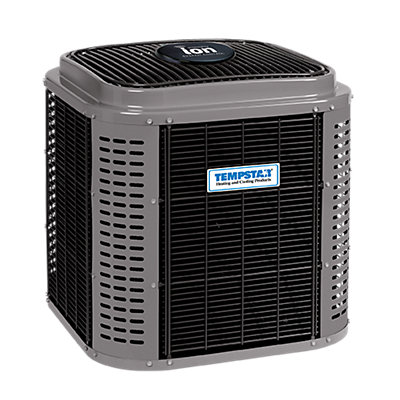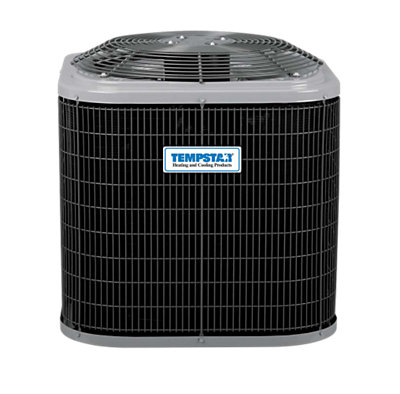Snag this Limited Time Offer
Tempstar Ion™ Series Air Conditioners
Our Tempstar premium Ion™ air conditioners feature enhanced levels of comfort and temperature control. To optimize the performance of these units use our Ion™ System Control with Wi-Fi® capability for maximum comfort control.
Benefits of an Tempstar Ion Series Air Conditioner:
- Coolray's Parts & Labor Warranty
- Efficiency ratings of up to 19 SEER
- Different sizes to fit any home
- 5 stages of variable-speed fan works with compressor for the best temperature and summer humidity control
- Extremely quiet operation (as low as 56 decibels)
- ENERGY STAR qualified
- 10-Year No Hassle Replacement™ Limited Warranty
- Wi-Fi® enabled remote access with the Ion™ System Control

Tempstar Performance Series Air Conditioners
Economical and budget-friendly, our Performance air conditioners can help maintain your comfort even in the hottest of summers.
Benefits of a Tempstar Performance Series Air Conditioner:
- Coolray Parts & Labor Warranty
- Efficiency ratings of up to 18 SEER
- Cooling stages Two-stage operation for efficiency and comfort
- ENERGY STAR qualified
- Quiet operation
- Durably built with tight wire grille and protective corner posts to withstand bad weather and debris

Air Conditioning Overview
What People are Saying
Get Service with Confidence
Easy Financing Options To Suit Your Needs
Coolray Warranties Available To Protect Your System
Frequently Asked Questions
Ice or frost spotted anywhere on your AC, means you have a frozen evaporator coil.
Do this now: Defrost the coil to prevent damage. Head to your thermostat, turn your AC off and switch your fan setting to ON. This will power down the cooling cycle but allow your fan to continue to blow air over the coil to help melt the ice.
Now, before we get into the problems that caused the frozen coil, let’s look at why the ice is there in the first place…
How and why ice forms on your evaporator coil
Your evaporator coil is the A-shaped group of copper tubes inside your indoor unit. Cold refrigerant runs through these coils, collects heat from your home’s air and moves the heat outside.
And as warm air hits the coil, condensation occurs. Normally, this condensation is drained safely out of your home.
But 2 problems can cause the coil to get so cold that it freezes the moisture on the coils:
- Low airflow
- Low refrigerant charge
Let’s look at each of these problems and what causes them in more detail.
Problem #1: Restricted airflow
If there’s something restricting or reducing the amount of air flowing through your AC system, the coil will freeze.
Common problems that cause restricted airflow include:
- Dirty air filter – Make sure you’re checking your air filter once a month and changing it when it’s dirty.
- Closed or blocked vents – Do not ever close or block vents!
- Dirty evaporator coil – The buildup of dirt on your coil is similar to a dirty air filter. A trusted tech can clean the evaporator coil as part of a maintenance visit.
- Damaged indoor blower – The blower moves all the air through your system. If it isn’t working properly, your coil can freeze.
Problem #2: Low refrigerant charge
A low refrigerant charge means you have a refrigerant leak. Refrigerant isn't “used up” like gas in a car. If you suspect refrigerant is a problem you’ll need a professional air conditioning contractor to find and fix the leak, clear out the remaining refrigerant, then add the right amount of refrigerant that your AC requires.
“How long does Freon last?”
Freon (which is really just a particular brand of refrigerant) lasts forever. It’s not like gas in car; it does not get “used up.”
You see, your air conditioner’s refrigerant system is a “closed/sealed system,” meaning that it does not allow refrigerant to escape in any way.
Of course, if you are low on refrigerant your system has a leak. So adding refrigerant without addressing the leak wastes money. A ton of it.
R-22 refrigerant (a common refrigerant in older ACs) is expensive because it’s being phased out by the EPA. Adding 7 lbs of Freon could easily cost you $700.
So, that leads to the next question.
“Are Freon leaks inevitable?”
Yes. Age eventually takes its toll on an air conditioner, so you could say a refrigerant leak is inevitable. Refrigerant circulates under high pressure and therefore wears down and thins the inside of the tubing.
A better question is, “What can I do to prevent refrigerant leaks?”
Your goal is to prevent refrigerant leaks and, when you do get them, nip them in the bud before they get too large. The larger the leak, the more refrigerant you lose.
How to prevent refrigerant leaks
Keep your dog away from the outside AC unit
Dog urine is acidic and can eat through the refrigerant coils. So keep your pooch away. Alternately, you could add a small fence around the unit. But make sure you leave at least 2 feet of space free around the AC so it can cool your home properly.
Get professional AC maintenance once a year
Many leaks occur because of vibration and wear and tear at multiple joints in the system. Annual air conditioner maintenance can catch any possible leak problems before they become expensive disasters.
You can— and should— run your A/C and ceiling fan together. Doing so can help lower your cooling costs each month, but only if you’re using them right.
- Turn on your ceiling fan only when you’re home and in the room where the fan is running.
- When your ceiling fan is on, turn your thermostat up 4°F. You’ll be just as comfy!
Subscribe to Our Newsletter
Get up-to-date current news, promotions and industry tips.
Service Area
View our service area in Tennessee.
Financing
We offer a variety of financing options.
Offers
Save money on our services.

